
Publisher:
Bonnie King
CONTACT:
Newsroom@Salem-news.com
Advertising:
Adsales@Salem-news.com

~Truth~
~Justice~
~Peace~
TJP
Jun-20-2010 18:23

 TweetFollow @OregonNews
TweetFollow @OregonNews
Oil and the Falklands
Dexter Phoenix Salem-News.comIn the long run, I would seriously doubt BP would do a risky deep sea drilling after the recent disaster that has been swarming all over news.
 Courtesy: managingip.com |
(SALEM, Ore.) - BP plc is a British-based global energy company which is the third largest energy company and the fourth largest company in the world. As a multinational oil company, BP is Great Britain’s largest corporation.
The company is among the largest private sector energy corporations in the world. It is one of six major vertically integrated private sector oil exploration, natural gas and petroleum product marketing companies. Petroleum merged with Amoco, an “American” Oil company back in December of 1998, which became BP Amoco plc. In 2000, BP Amoco acquired Arco Atlantic Richfield co, as well as Burma Castrol Plc.
Most Amoco stations in the United States were converted to BP's brand and corporate identity. In many states however, BP continued to sell Amoco branded gasoline even in service stations, with the BP identity as Amoco, which was rated the best petroleum brand by consumers for 16 consecutive years It also enjoyed one of the three highest brand loyalty reputations for gasoline in the US, comparable only to Chevron and Shell.

In May 2008, when the Amoco name was mostly phased out in favour of BP , promoting BP's new additive (the highest grade of BP gasoline available in the United States) it was still called Amoco Ultimate.
In April 2004, BP decided to move most of its petrochemical businesses into a separate entity called Innovene within the BP Group. BP sought to sell the new company in the US, and filed IPO plans for Innovene with the New York Stock Exchange on the 12th of September 2005. On 7 October 2005, however, BP announced that it had agreed to sell Innovene to INEOS, a privately held UK chemical company for $9 billion, thereby scrapping its plans for the IPO. In 2005, BP announced that it would be leaving the Colorado market, making many locations re-branded as Conoco.
BP has grown its oil exploration activities in frontier areas such as the former Soviet Union for its future reserves. In Russia, BP owns 50% of TNK-BP with the other half owned by three Russian billionaires.
You will also be surprised about other companies that BP owns, or are involved with like AMPM (a well known American convenience store chain that branches through several U.S. States) which also sells fuel from BP.
Aral, is a German based company that BP also is a part of which entails retail chains under the name of Aral. Then there is Arco. Arco is BP’s retail brand and is mostly located all the long the West Coast of America. The list goes on and on.
I find it all quite amusing when I read all of the negative publicity about pointing the big bad finger over the Atlantic to Great Britain, when in fact BP is actually run, and involved mostly with “American” companies… with American people running it! This just shows you how desperate a country like America is and how hypocritical they really are to turn their backs on us, when it comes to (what it seems) as a desperate need to turn anti British at any given opportunity. This of course is rather immature and childish, something you only expect to see at a high school playground with innuendo rumours flying around like some nasty little uncontrollable air born virus. But it seems this little airborne virus has been working over time south of the equator as well, starting with Argentina.
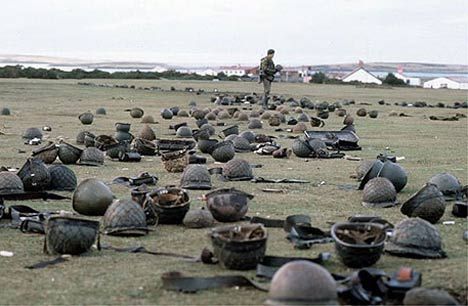 Battlefield from the 1982 Falklands Island War |
The Falkland’s War was fought in 1982 between Argentina and Great Britain over the disputed Falkland Islands, South Georgia and the South Sandwich Islands. The Falkland Islands consist of two large and many small islands in the South Atlantic Ocean, east of Argentina.
The Falklands War started on Friday, 2 April 1982 with the Argentine invasion and the occupation of the Falkland Islands, as well as South Georgia, and ended with the Argentine surrender on 14 June 1982. The war lasted 74 days, and resulted in the deaths of 257 British and 649 Argentine soldiers, sailors, and airmen, and three civilian Falklanders. It is the most recent conflict to be fought by the UK without any allied states and the only external Argentine war since the 1880s.
The conflict was the result of a protracted “diplomatic confrontation” regarding the sovereignty of the islands. Neither state officially declared war and the fighting was largely limited to the territories under dispute and the South Atlantic.
The initial invasion was characterized by Argentina as the re-occupation of its own territory, and by the UK as an invasion of a British dependent territory.
Britain launched a naval task force to engage the Argentine Navy and the Argentine Air Force, to retake the islands by amphibious assault. The British eventually prevailed and at the end of combat operations on 14 June the islands remained under British control. However, as of 2010 and as it has been since the 19th century, Argentina shows no sign of relinquishing its claim. The claim remained in the Argentine constitution after its reformation in 1994.
The Politics of Argentina at that time

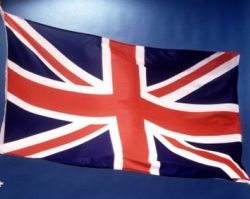
Relations between Argentina and UK were restored in 1989 under the umbrella formula which states that the islands sovereignty dispute would remain aside.
In the period leading up to the war, and especially following the transfer of power between military dictators General Jorge Rafel Videla and General Roberto Eduaro Viola in late-March 1981, Argentina had been in the midst of a devastating economic crises and a large-scale civil unrest against the military junta that had been governing the country since 1976.
In December 1981 there was a further change in the Argentine military regime bringing to office a new junta headed by General Leopoldo Galtieri (acting president), Brigadier Basilio Lami Dozo , and Admiral Jorge Anaya. Anaya would be the main architect and supporter of a military solution for the long-standing claim over the islands, calculating that the United Kingdom would never respond militarily. In doing so the Galtieri government hoped to mobilize Argentines' long-standing patriotic feelings towards the islands and thus divert public attention from the country's chronic economic problems and the regime's ongoing human rights violations. Such action would also bolster its dwindling legitimacy. The newspaper La Prensa speculated in a step-by-step plan beginning with cutting off supplies to the Islands, ending in direct actions late 1982, if the UN talks were fruitless. The retaking of the Falkland Islands was considered extremely difficult:
The main constraint was the disparity in deployable air cover, the British having 34 Harrier aircraft (the only plans the British could take over at such distance, keeping them close and on constant standby without costly long distance refueling, or diplomatic headache trying to leverage a base on South America to refuel on, the Argentina’s had 220 jet fighters at their disposal.
The U.S. Navy considered a successful counter-invasion by the British to be 'a military impossibility'. The United States initially tried to mediate an end to the conflict. However, when Argentina refused the U.S. peace overtures, U.S. Secretary of State Alexander Haig announced that the United States would prohibit arms sales to Argentina and provide material support for British operations. Both Houses of the U.S. Congress passed resolutions supporting the U.S. action siding with the United Kingdom.
The Islanders
The islanders subsequently had full British citizenship restored in 1983, their lifestyle was improved by investments Britain made after the war and the liberalization of economic measures that had been stalled through fear of angering Argentina.
In 1985, a new constitution was enacted promoting self-government, which has continued to dissolve power to the islanders.
The war for Argentina also had an effect in the form of avoiding a possible war with Chile and, more importantly, the return of democracy. It had a major social impact, destroying the military's image as the moral reserve of the nation that they had maintained through most of the 20th century.
The history of the Falkland Islands
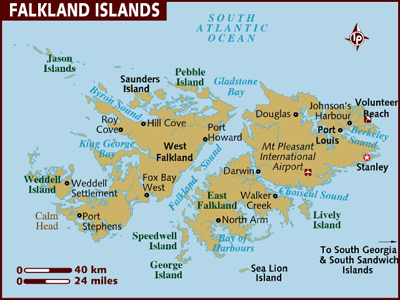
The Falkland Islands were originally Spanish. During the Napoleonic Wars, Britain took them from Spain. Later on, Argentina revolted against Spain and declared its independence. The islands had various claimants until the British made their claim stick in the mid 19th century. The islands have been British for about the last century and a half.
Britain's claim to the Falklands is also further bolstered under International Law. The territory was taken from Spain during a recognized State of War, and Britain never agreed to return it. Should Britain decide to return it, they would logically be returning it to Spain, NOT Argentina, as Argentina never controlled the island save for those few months in 1982.
This would explain Spain’s back door intervention in supplying Argentina with weapons, financing, logistics and supplies.
The people of the Falkland Islands also had a choice on what country they would rather be governed under, unanimously they chose to be under British rule. Time and time again they showed, as well as mentioned “explicitly, that they do not want to be under Argentine rule. Thus, the principle that a territory should be governed according to the will of the majority of inhabitants is in favor of having the Falklands remain British.
Also having a more stable political back bone as liberal parliamentary democracy, and has been so (for various values of "liberal parliamentary democracy") for centuries (certainly since the mid-19th century Reform Acts).
Argentina, by contrast, has frequently veered into dictatorship -- in at least two cases, bloodthirsty Fascist dictatorship. (It was under Galtieri's sanguine rule that Argentina screamed and leapt on Britain in 1982: his subsequent defeat was the proximate cause of his fall from power). We should support liberal democracies against dictatorships in general; and although Argentina is now a democracy, the country's history gives us little reason to hope that it shall remain as such.
Argentina tries to impose a shipping block aid towards the Falkland Islands
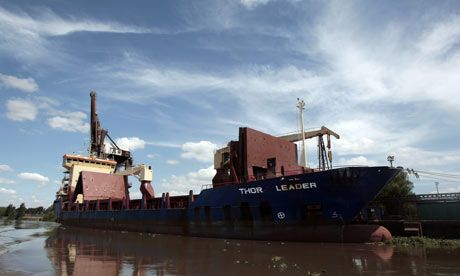 Courtesy: Guardian UK |
Chris Bryant, the Minister for the region, said that Britain had "no doubt about our sovereignty over the Falkland Islands".
"It is underpinned by the principle of democratic self-determination. Falkland Islanders want to remain British," he added.
Earlier, Argentina had imposed a new requirement for shipping to get permission to go from there to the islands. This was in response to the start of drilling for oil off the Falklands, within the exclusive economic zone claimed by the Falkland Islands government, with the support of the UK.
Even Venezuelan President Hugo Chavez barked out a warning to Britain that if it came to one, Argentina would not be alone this time.
President Chavez also mentioned rudely but rather amusingly that seems to befit such a President advice for the British monarch: "Queen of England, I'm talking to you. The time for empires is over, haven't you noticed? Return the Malvinas to the Argentine people."
With recent accusations of political bribery, black mail, cohering as well as copious amounts of “golden hand shakes” thrown in there for good measures, Argentina as well as most of south America once again shows its true colours, by showing its proven unstable political behavior on the world wide political scene.
Same again as it were back in 1981 Argentina is yet struggling with another mass dosage of unruly public, angry again that there country is deep in the abyss of economic uncertainty and disorder. Again their new president Cristina Fernández de Kirchner is rousting up patriotism like the previous president did just before the Falklands conflict, to arouse support and to take their minds off their diabolical economic situation. Once again another Argentine President is pointing the finger at Great Britain. The controversy surrounding plans to drill for oil in the waters surrounding the islands has stoked hostility in recent weeks:
Demonstrators will march on the British Embassy in the capital to mark the Argentine’s brief occupation of the Falkland Islands during 1982.
This year's memorial has been given extra impetus due to recent oil exploration off the islands' coastline undertaken by British companies, reigniting Argentina's historic claim to the 'Malvinas'.
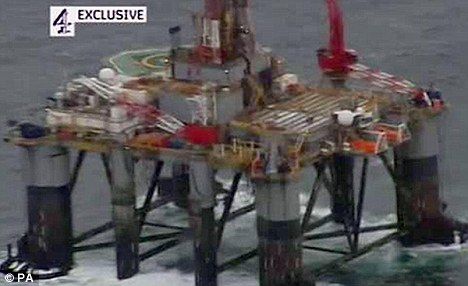 Controversial: The drilling rig Ocean Guardian, which is due to explore oil reserves |
The march has been organized by the Asociación Civil Combatientes en Malvinas and has the backing of several trade unions. Marches in previous years have rallied only a few hundred people but organisers are predicting many thousands will take to the streets to show their anger over the British exploration. Organisers are demanding the complete block of the “pirate” oil platform Ocean Guardian, operated by the UK's Desire Petroleum and calling for a boycott of British companies within Argentina. Two separate demonstrations will set off from different areas of Buenos Aires before marching towards the British Embassy in the city centre.
A British Embassy spokesperson wouldn't comment on the specific events organised for Friday but warned British nationals to stay away from all marches.
Argentine President Cristina Kirchner talked of an endless fight to win back sovereignty of the sparsely populated archipelago.
The president, who will be attending a memorial service in Ushuaia, southern Argentina, said: “The battle is going to be eternal but it is not going to be like in the past, “with force”. We're going to put up a cultural, political and diplomatic fight on all fronts and in all forums in defense of our heritage which is not just heritage but also the management of our resources.”
Protests are scheduled despite Desire Petroleum's announcement earlier this week that its initial explorations had revealed poor quality petroleum. Desire is one of four British companies granted a license to drill for oil. The company is expected to give more detailed information on its finding by the end of the week. Tensions between Argentina and Britain have reached new heights in recent months due to the exploration. Argentina secured the backing of other South American countries recently over their Falklands claim and has also asked the UN to call the UK to talks. Britain has insisted it will never discuss the sovereignty of the Falklands but is prepared to hold talks on oil exploration.
Oilprice.com View
 Riordan Roett |
Argentina's oil battle with the United Kingdom rages on, the only other obstacle the South American country can throw at oil companies planning to drill near the Falkland Islands is to interdict U.K. ships or equipment - but regional expert Riordan Roett doubts the Argentines are “stupid enough to do that.”
This would be a “very dangerous move” on the part of the Argentine government, said Roett, director of Latin American studies at Johns Hopkins University in Washington. Argentina, which went to war with the U.K. in 1982 over Falklands’ sovereignty, is “very careful” about challenging the British in reaching the islands, Roett noted.
The dispute between the old foes erupted in February when U.K.'s Desire Petroleum towed an oil rig from Scotland to the South Atlantic to drill near the Falklands.
Experts tout the area beneath the islands contains as much as 60 billion barrels of crude oil but there are many doubts about this claim.
Geologists and political-risk specialists say such a vast deposit is possible -- after all, the Atlantic Coast downward from Brazil boasts a great deal of oil – but whether the Falklands is the next place to find such resources will be a question mark for “a couple of years,” Roett said.
Oil and Latin American experts, moreover, have mixed opinions about whether U.K. oil firms actually need the Argentine government's help to siphon out any oil from the contested waters.
U.K. firms can do without Argentine infrastructure but much will depend on current technologies, Roett argued. If companies can retrieve and pour oil into super tankers, it can then be shipped back to the U.K. or wherever their clients are based “without worrying about Argentina -- unless the Argentinians were stupid enough to try to stop the tankers,” he said.
 Argentina’s President Christina Fernández de Kirchner |
In the midst of this, it’s doubtful any Latin American country will cooperate with the U.K., Kerner said. Argentina’s President Christina Fernández de Kirchner in fact has been rallying support from her continental neighbours, and in recent days began to mend fences with Peru, a country it fell out of favor with 16 years ago.
Kirchner has done everything in her power to make it difficult for companies pursuing the potential oil windfall. Kirchner forced boats using Argentine ports or passing through the country's waters en route to the Falklands to get special permits, and introduced a United Nations resolution reprimanding the U.K. for permitting oil exploration off the islands. The president also tabled a bill that would impose a 30-day deadline on firms to sever ties with the islands or be run out of Argentina.
The U.N. has passed several resolutions urging both sides to negotiate but the British have declined, Kerner said. Except for Latin America, most of the countries in the world recognize the British position on the Falklands, Roett told OilPrice.com. British sovereignty over the Falklands was declared in 1833. The Argentine military “ran into Margaret Thatcher in 1982. I don't think Christina Fernández de Kirchner wants to run into the British fleet here in 2010.”
The U.K., which reportedly dispatched a nuclear submarine to the islands to safeguard oil exploration there, has “reinforced on the Falklands their military capabilities, particularly their air force,” Roett said. And the British are better prepared to dominate the air space over the islands, he added, but doubted the row will lead to actual war again.
Large IOCs so far are “moving very carefully” due to the risks associated with a “very unpredictable Argentine government,” Roett said. But if Desire Petroleum demonstrates there probably is a “reasonably large deposit,” companies will descend, he said.
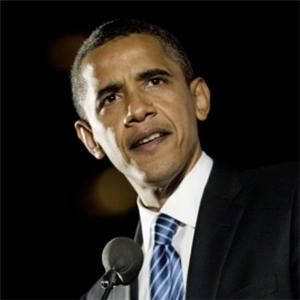 U.S. President Barack Obama |
Real truth comes out of what Obama truly thinks of its closest ally, by a senior State Department protocol official who said “There’s nothing special about Britain. You’re just the same as the other 190 countries in the world. You shouldn’t expect special treatment”.
According to a story recently published on timesonline.co.uk a State Department spokesman said:
"We are aware not only of the current situation but also of the history, but our position remains one of neutrality. The US recognizes de facto UK administration of the islands but takes no position on the sovereignty claims of either party."
The remarks had echoes of an earlier statement by a senior State Department protocol official who, when asked about the shoddy treatment of the British Prime Minister in March last year, responded:
There’s nothing special about Britain. You’re just the same as the other 190 countries in the world. You shouldn’t expect special treatment.
Even by the relentlessly poor standards of the Obama administration, whose doctrine unfailingly appears to be “kiss your enemies and kick your allies”, this is a new low. The White House’s neutrality in a major dispute between America’s closest friend and the likes of Venezuelan tyrant Hugo Chavez, Argentina’s biggest backer, represents the appalling appeasement of an alliance of anti-Western Latin American regimes, stretching from Caracas to Havana – combined with a callous indifference towards the Anglo-American alliance.
 Venezuelan President Hugo Chavez and Russian Federation |
Over the course of the last year, we’ve seen a staggering array of foreign policy follies by this administration, from the throwing under the bus of the Poles and the Czechs over missile defence to siding with Marxists in Honduras. But this latest pronouncement surely takes the biscuit as the most brazen betrayal so far of a US ally.
As the Obama government is amply aware, the tensions between London and Buenos Aires are escalating dramatically, with British military contingency planning already under way. In effect, Washington declared today that it would remain neutral in the event of another war in the South Atlantic, a stunning declaration to make.
Thousands of British soldiers are laying their lives on the line alongside their American allies on the battlefields of Afghanistan. Yet the president of the United States is either unwilling or too timid to offer a single word of support for the British people, who face a mounting confrontation with a corrupt, populist Argentine government that is threatening a blockade of British territory. To put it bluntly, the Obama administration is killing the Special Relationship, and the prospects of a recovery look extremely bleak as long as Barack Obama remains in the White House.
I am in no doubt though that messages of support for Britain will begin to flow in the coming days from Senators and Congressmen who actually understand the importance of Anglo-American friendship and loyalty, and who recognize the tremendous value of the ancestral, linguistic, economic, cultural, military and intelligence ties that bind the two greatest nations in the world. And I am very sure that the vast majority of Americans will reject the spineless neutrality of the White House and State Department, and wholeheartedly support the British people in the event of another conflict.
The controversy surrounding plans to drill for oil in the waters surrounding the islands has stoked hostility in recent weeks.
Demonstrators will march on the British Embassy on the anniversary of the Argentina's brief occupation of the Falkland Islands during the 1982.
This year's memorial has been given extra impetus due to recent oil exploration off the islands' coastline undertaken by British companies, reigniting Argentina's historic claim to the 'Malvinas'.
The march has been organised by the Asociación Civil Combatientes en Malvinas and has the backing of several trade unions.
Marches in previous years have rallied only a few hundred people but organisers are predicting many thousands will take to the streets today to show their anger over the British exploration.
Organisers are demanding the complete block of the "pirate" oil platform Ocean Guardian, operated by the UK's Desire Petroleum and calling for a boycott of British companies within Argentina.
Desire is one of four British companies granted a license to drill for oil. The company is expected to give more detailed information on its finding by the end of the week. Tensions between Argentina and Britain have reached new heights in recent months due to the exploration.
Argentina secured the backing of other South American countries recently over their Falklands claim and has also asked the UN to call the UK to talks.
Britain has insisted it will never discuss the sovereignty of the Falklands but is prepared to hold talks on oil exploration.
US President Barack Obama has come under fire on both sides of the Atlantic for failing to support Britain in its dispute with Argentina over drilling for oil off the Falkland Islands - and reports suggest that the US is taking revenge on Britain for releasing CIA files on former Guantanamo detainee Binyam Mohamed.
So far the criticism has come mainly from the right, but accusations that Obama has deserted its biggest ally in favour of an Argentinean president backed by such anti-American leaders as Hugo Chavez could well strike a chord with those of a less conservative bent if the row rumbles on.
The news that the US Secretary of State Hillary Clinton is to meet the Argentinean president Cristina Fernández de Kirchner at a summit in Uruguay on Monday has merely rubbed salt into the wounds - and led British officials to let it be known, via the Times of London, that US support for negotiations would not be welcomed. It is "up to the islanders whether they want mediation or not" an official said.
Despite this, La Nacion, an Argentinean newspaper, perhaps hopefully, claims a US State Department source as saying Clinton is "prepared to mediate" in the row.
Officially, the US has said the Falklands are strictly an issue for Argentina and Britain. The State Department told the Times: "We are aware not only of the current situation but also of the history, but our position remains one of neutrality."
 U.S. & British soldiers in a Kabul alley |
But Alan Mendoza, the director of London-based think-tank the Henry Jackson society, told the Daily Mail he thought this neutrality has a lot to do with a court ruling two weeks ago that forced the British government to release CIA files on Binyam Mohamed, the former Guantanamo Bay detainee. Mendoza sees this as a poor excuse for deserting Britain, however: "The Obama administration's decision to ignore the democratic rights of the Falkland islanders is disgraceful," he says.
A leader in the usually pro-US Daily Mail goes so far as to question the so-called 'special relationship'. "This deeply regrettable response leaves us with the question; what is the purpose of a special relationship that seems to involve British sacrifice on one side and American indifference on the other?"
Across the Atlantic, the heritage foundation a conservative think tank said: "Even by the relentlessly poor standards of the Obama administration, whose doctrine unfailingly appears to be 'kiss your enemies and kick your allies', this is a new low."
Redstate.com, one of the most popular right-wing American blogs, said Obama "chose to side with a corrupt, aggressive Argentine government that is backed by Hugo Chavez and is threatening a blockade of British territory. This is how Obama repays Britain for continuing to support our special relationship and providing thousands of British soldiers in... Iraq and Afghanistan."
The truth is that Clinton's tour of Latin American countries – which voted this week at a summit in Mexico to found a new union excluding the US – was going to be difficult enough without Obama giving a message of support to Britain in the meantime.
Desire Petroleum plc: is a British Aim Listed oil company that has oil prospects in the Falkland Islands It was established in 1996 by Dr. Colin Phipps, a former geologist for Shell, working in Venezuela, the Netherlands and the USA. The company is named after Desire, the ship, captained by John Davis, that discovered (ironically) the Falkland Islands in 1592. In 1998, the company was floated on the Alternative Investment Market.
Company interest in the Falkland Islands
 Colin Phipps |
Since the late 1990’s Colin Phipps was interested in the geology of the Falkland Islands, and its potential to be petroliferous. He had visited the islands since the mid-1970s, and from his experience of geology had great optimism for finding petroleum in the area when a seismographic survey in 2004 'came up with the goods'. Desire Petroleum were awarded licenses for drilling in the Falklands in 1997, and test drilling was carried out in 1998.
Oil was not found in commercial quantities, and the price of oil, until 2007-8 was not high enough to make it viable, and exploration companies left the area. A 3D seismic survey was acquired in 2004 which showed great oil potential.
In February 2010 Desire began a programme of exploratory drilling, with costs shared by farming out drilling slots to Rockhopper Exploration (England) , Falkland Oil & Gas Ltd, in the North Falkland Basin. In the northern section of the basin this covers the prospect of Rachel, Kath, Pam, Ann, The second well, drilling for partner company Rockhopper Exploration, was an oil discovery which further confirmed the geological model for the North Falkland Basin for Desire and Rockhopper's remaining prospects.
If The drilling programme goes through it is anticipated to run to ten exploration wells.
Argentina still has not given up its claims that the Falklands is still their’s , and formally objected to the start of oil exploration.
Several British companies are poised to begin offshore exploration using a $35 million offshore rig, the Ocean Guardian. Desire Petroleum Plc has licensed six areas where it predicts 3.5 billion barrels of oil and 9 trillion cubic feet of natural gas can be recovered. Six companies hold license for oil exploration in the region- Desire, Falkland Oil & Gas, Rockhopper, Borders & Southern, Argos Resources and Arcadia
UPDATED QUOTE from FOX News on kaystreet.wordpress.com:
Bill O’Reilly was On the heels of demolishing Sarah earlier in the week:
Our “no spin zone” guy took on Michele last night (6/18/10) over her comments complaining that President Obama had exceeded his jurisdictional limits to “extort” BP to put up $20 billion for an oil-spill-victims fund. Bachmann has since backtracked from her previous comments. She made the unlikely excuse to O’Reilly that what she had really meant was that she was worried about who would administer the fund. And then she blamed the Democrats for making her overly suspicious. Although I would have loved to have seen O’Reilly hold her feet to the fire more about her disingenuous waffling, I can’t say O’Reilly pulled a lot of punches.
The same is not true for Foxnews.com. They helped softpedal her comments by calling the interview, All about 'Extortion' or 'politicizing' the fund? and gave it the subtitle, “Michele Bachmann explains her criticism of Obama ordering BP to set up oil spill compensation fund.”
Bachmann’s original comments were made at a Heritage Foundation lunch where she advised BP not to be “chumps” or get “fleeced” to pay for “perpetual unemployment and all the rest — they’ve got to be legitimate claims. “The other thing we have to remember is that Obama loves to make evil whatever company it is that he wants to get more power from. He makes them evil, and what we’ve got to ask ourselves is: Do we really want to be paying $9 for a gallon of gas? Because that could be the final result of this.”
Bachmann also told CNSNews, “it seems that it’s all about extortion–and that what they want to do is create a pot of money for themselves that they can control and that’s not what the Executive is supposed to do. There is a real misreading of jurisdictional limits, and they continue to stretch those limits beyond all bounds.”
On The Factor, O’Reilly asked, “If the executive branch, the presidency, isn’t going to force BP to pony up the money, who will? Who would?”
“But that’s not how it came across,” O’Reilly said sharply. “How that statement came across to me was that you said, ‘Look, Obama has overstepped his power… by taking a private corporation and forcing that corporation, BP, to put $2 billion in a till.’ Now, I don’t want it to be politicized, you don’t and I don’t think anybody in this country wants that fund to be politicized. What we want is, that the money gets to the people who are suffering as quickly as possible – exactly what happened after 9/11.”
Article from: kaystreet.wordpress.com
In the long run, I would seriously doubt BP would do a risky deep sea drilling after the recent disaster that has been swarming all over news. They might assist under subcontracting endeavors, but to see a BP rig stuck in the middle of a diplomatic nightmare between Britain and Argentina, under watchful eye of the worlds news, would be Suicidal for BP as well as disaster for their PR department.
(see: History of Oil spills and Disasters) Also:
Apr-30-2010: An Insider's View Into the Oil Spill Crisis - Dexter Phoenix Salem-News.com
 Dexter Phoenix has worked as a staff and freelance photographer since the mid-1990's and has a wealth of professional experiences on his resume. We welcome his presence to our staff and Salem-News.com.
Dexter Phoenix has worked as a staff and freelance photographer since the mid-1990's and has a wealth of professional experiences on his resume. We welcome his presence to our staff and Salem-News.com.
This native of Great Britain moved to Los Angeles in 2007, where he photographed general news, general Interests, sports, freelance model photo work, and also stock images. In his career Dexter has had photos published: World wide, in many magazines and newspapers and online. Throughout the course of his career he has experience with technology of all imaginable types. In his career as a photographer Dexter has covered stories in Norway, Sweden, Italy, Spain, Great Britain, France, Mexico, Israel, Palestine, Lebanon, Turkey, Somalia, Tunisia, Algeria. Angola, Iran, Dubai, Saudi Arabia, Brazil, Colombia, United States. Email inquiries about photo purchase to Dexter at the above address.
You can email Dexter Phoenix, Salem-News.com Photographer/Reporter, at innocent_p0stcard@hotmail.com
Articles for June 19, 2010 | Articles for June 20, 2010 | Articles for June 21, 2010
Salem-News.com:



googlec507860f6901db00.html

Terms of Service | Privacy Policy
All comments and messages are approved by people and self promotional links or unacceptable comments are denied.
Vic June 23, 2010 6:56 am (Pacific time)
Tim King: Well this comment started a series of personal return comments which don't need to be here. So the comments on this story are closed to all.
Dexter June 22, 2010 6:16 pm (Pacific time)
gp: Thanks for the heads up on that. I will go and check it out "South of the Border" . But I was only commenting on what I had witnessed and experienced "mostly" from when I was living or working in central or south America.
Ersun Warncke June 22, 2010 3:20 pm (Pacific time)
I am not sure about your comments on South America. How much of England's native forests are left? How about your oil and coal? If you look at the U.S.'s top trading partners (http://www.census.gov/foreign-trade/statistics/highlights/top/top1004yr.html) you will see that the U.K. is #6, beneath Germany. Given the tendency toward financial fraud of the London/New York set, I expect that the total transfer between the U.K. and U.S. is grossly inflated.
gp June 22, 2010 2:53 pm (Pacific time)
Speaking of corruption...the Judge who lifted the drilling ban owns well drilling stock, here is the link:http://www.huliq.com/8738/judge-who-lifted-moratorium-owns-drilling-stocks
gp June 22, 2010 2:27 pm (Pacific time)
Dexter, You really should see Oliver Stone's new movie where he shows how South America is leading the way as far as governments paying attention to the poor and getting away from the heroin type dependency on the IMF and the World Bank. Your perceptions of South America are antiquated and you could do with some reading of Edward Galeano, Naomi Klein but the Stone movie which opens this week in the US and is titled :South of the Border will be less time consuming and correct many of your misconceptions. Those mean little things you said apply better to the US and Scotland and Liverpool.
Dexter June 22, 2010 1:52 pm (Pacific time)
Ersun Warncke: Actually, get your facts right about America investing in the U.K and visa versa. There has been billions of dollars-pounds exchanging hands between our countries when it has come to business. It varies from Cell phone companies, to car making, clothing, oil and gas, Military joint projects, intelligence sharing and joint military missions, trading, shipping, and not to mention other countries that Britain still owns and controls businesses in, that America still shows interests in. South America?, an unstable backward world that likes to destroy it's own ecosystem by chopping down most of the rain forest! Or how about the lack of good products coming out of South America, instead you resort to Colombia's best export "Cocaine". MMMM what a fantastic part of the world this is... most of the people living in poverty, corruption, economic instability, a true deep down hatred of "America" as well as most of Europe and Britain (inferiority complex anyone?), need I say more :) .
Ersun Warncke June 22, 2010 10:19 am (Pacific time)
The "special relationship" between the U.S. and Britain is mostly a fantasy of British politicians trying to aggrandize themselves. Of the European nations, Britain has the least to offer any "strategic partners." What is their expertise exactly? Financial scams, imperialism, and a super annoying aristocratic class? Germany and Russia are both far more important countries in terms of trade, and they actually produce things of real value. Worldwide, the truly important allies of the U.S. are Canada, Mexico, Japan, South Korea, Taiwan, China, and the aforementioned European countries. The U.S. had a policy, which was a wise one, of using its power and geographical advantage as a shield for Central and South American countries against European interference. In exchange, of course, for preferential trade agreements. If anything, that policy should be dusted off. The U.S. should never side with any European country against its own geographic allies in the Americas.
Hand of God June 22, 2010 9:19 am (Pacific time)
Get over it! Your dang empire is done, over, finished, kaput! You pansy crybabies need to give the islands back to the South Americans. While you're at it, let 'em have the oil too. You guys have already stolen enough from Latin America, Iraq, Iran, and most of the rest of the world. All you care about is another big pay day. Quit droolin' over your next bonanza and start packin'. Time's up, pals.
Anonymous June 21, 2010 3:57 pm (Pacific time)
Ralph Nader has this to say today on Counterpunch: "Five oil company executives, including from BP, admitted at a Congressional hearing this week that they did not have contingency plans worked out for catastrophic failures. What is, by comparison, the worst case scenario for offshore windfarms or solar/thermal conservation, or passive solar architecture? Energy Secretary Stephen Chu still does not note such a criteria to differentiate between energy supply priorities."
gp June 21, 2010 3:33 pm (Pacific time)
Oil spill brings 'catastrophe' to Egypt Mon, 21 Jun 2010 Egyptian oil spill in the Red Sea has caused a new environmental catastrophe, prompting an outcry among activists that call for tighter offshore regulations. Huge quantities of crude gushing from Egypt's offshore platforms in the Red Sea have reached the coasts of Egyptian tourist hub Hurghada, AFP reported. Hurghada attracts millions of tourists for diving and snorkeling, the report says. Hurghada Environmental Protection and Conservation Agency (HEPCA) says the leak started about 4-5 days ago but the companies in charge, covered up the "catastrophic" incident. Officials have declined to reveal the name of the liable companies, the report said. Egypt's environment and tourism ministries state that the leak is contained and preparations have been made to clean up the pollution. HEPCA, however, criticized the government's insufficient reaction. It called for a clearer plan of action to prevent further environmental disasters. "We would also like to see more stringent standards imposed on these offshore platforms to ensure natural areas are protected," said HEPCA Managing Director Amr Ali. In recent weeks, oil spills from offshore rigs have caused severe environmental disasters across the globe. The United States is embroiled in its worst environmental disaster after BP's Deepwater Horizon collapsed, gushing about a million gallons of crude into the Gulf of Mexico. Elsewhere in Nigeria, the government has threatened to levy punitive sanctions against ExxonMobil, if the giant US oil company fails to contain the crude spills from offshore platforms in Nigeria's southeast Akwa Ibom State. ASH/MB
Amanda June 21, 2010 1:17 pm (Pacific time)
I am afraid people are getting off the topic here. These stories are not, in particular, about Britain. They are not about the US and they are not about the Falklands. They are about OIL and people having a problem with companies drilling for it! Well, I would like to say that if you have a problem with drilling for oil at land or sea or anywhere else on the planet it may lie then STOP USING PETROLEUM BASED PRODUCTS!!! Stop driving that nice new electric hybrid vehicle because the fact is the that the vehicle itself is made from petroleum based products! Stop using those plastic sandwich bags to send your childrens lunch in, actually stop using plastic in general! Stop sitting on that furniture which is probably made from synthetic fibers! Look, I am not downsizing the fact that oil spills are environmental crisises. I am simply saying that you cannot demonize the companies for supplying what we ALL are demanding! Lets get back to the point and figure out how we can wean ourselves off of our oil infested teat!
Anonymous June 21, 2010 9:33 am (Pacific time)
Why did current CEO of BP Tony Hayward dump approximately one-third of his BP stocks before the oil crisis? Why did Goldman Sachs dump a hefty 44% of its BP stock prior to, particularly given that Peter Sutherland was formerly CEO of both BP and Goldman Sachs at the same time? What are the odds that former Vice-President Dick Cheney’s firm Halliburton would purchase a company which “focuses on oil spill prevention and blowout response,” just weeks before the so-called ‘biggest environmental crisis’ of all time would strike? And how convenient for obama, who shocked us all when he approved of drilling in the gulf, now can say no (his true agenda)..and how convenient for obama, because after climategate, his cap and trade tax was fizzling, now its back on the main burner.. Why were swat teams sent to the gulf? Why is everything so secret? Why are they not accepting help from other countries? Why no media? Why is it, that whenever a disaster happens in this country, it benefits those in charge? Lets not forget the campaign contributions either.
Vic June 21, 2010 9:08 am (Pacific time)
I love these The-British-Are-God's-Chosen-People articles...You know, I could take a cat turd and frost it with cake frosting, even put some of those multi-colored sprinkle things on it, but the fact would remain that under the fluff lies a turd. Britain has centuries of brutal, oppressve, murderous arrogance to account for...excuse those of us who are not awestruck by your wild claims of superiority and benevolence. Britain is to the world like an abusive husband who beats the hell out of his wife repeatedly then shows up every so often with a flower and a candy bar and expects to be fawned over. America will make Britain's crimes pale in comparison very shortly, Im afraid... "I do not understand this sqeamishness about the use of gas. I am strongly in favour of using poison gas against uncivilised tribes." (Winston Churchill, discussing ways to deal with the uppity "uncivilized" people whose land the British stole at gunpoint.)
Dan June 21, 2010 8:32 am (Pacific time)
Dexter not a bad article. The reality is, regardless of one's viewpoint on the Falkland Islands is that they come under UK protection. Argentina was much stronger militarily back in 1982 and still were soundly defeated for their illegal incursion. They will never try that again, at least for far into the distant future. When it comes to beating up on energy producing corporations, well what are your "realistic options?" Since WWII there have been nearly 30,000 wells drilled in the Gulf of Mexico and this tragedy happened. Surprised that it did not happen sooner. Hopefully new technology will be developed to handle future accidents in a more productive and timely manner, think "necessity is the mother of invention." What we are witnessing now is what happens when you have very poor leadership. On the second day of this major spill, the Dutch offered their highly experienced assistance to DC, they were essentially ignored, and the delays and buffoonish decisions continue to ocurr. We are seeing what happens when amateurs are running the country. The current projected OIL SPILL COMMISSION membership is made-up entirely of academics, not one energy production professional on board. When gas at the pump continues to rise and impacts the prices of literally everything, then even the diehard supporters of the DC regime will be demanding new leadership. When you have a so-called leader who while in his state legislature voted "present" over 130 times, you should now understand that leadership requires an experienced executive decision maker, not a spinner and a blamer. We are in big trouble for the next several months.
Hoytred June 21, 2010 2:09 am (Pacific time)
Your history is out. The islands were never Spanish although the Spanish have tried to claim such from a 15th century Papal Bull. In reality the islands have been British since at least 1765 and probably 1690. Spanish attempts to throw Britain out in 1770/71 nearly led to a war and Spain backed down. Ignore any spurious claims of secret clauses and check your history. Spain lost. When Argentina similarly tried to take the islands in 1832 they were ejected by British forces having only managed to stay 2 months. Just like 1982. All this history is proveable although the Argentines manage to ignore the evidence.
NotReg June 21, 2010 1:22 am (Pacific time)
Given the recent wave of anti-British sentiment in the media recently, I'd like to say what an interesting, informative and thorough article. Well done.
Bob Hodges June 21, 2010 12:31 am (Pacific time)
Well done Dexter. People of British descent have been on the Falkands for 6 or 7 generations - long before Mr Kirchners grandparents arrived from Italy or Germany probably.
Simon Taylor June 21, 2010 12:48 am (Pacific time)
Dexter - an excellent piece of balanced and well researched journalism. What a contrast with the piece by your 'colleague' Mr Zawaski. Maybe you could give him a few tips? ;-)
EJW June 21, 2010 12:13 am (Pacific time)
About time a more factualy balanced article was written after that initial erroneous anti-British report. And for those commenters who don't like it, you had your chance, now let proper facts be heard.
Duncan Black June 20, 2010 11:53 pm (Pacific time)
A good overview of the political history of the Falkland Islands and the present drilling campaign there. Well done.
Dexter D June 20, 2010 11:06 pm (Pacific time)
Happyguts: Well thank dear sir, good to hear some "Positive" view on my story...I am glad to know that your guts are feeling good ;)
Happyguts June 20, 2010 10:16 pm (Pacific time)
Wow a lot more realistic view on bp and the falkland islands . Very good work sir
lalo June 20, 2010 7:54 pm (Pacific time)
Your rendering of the historical claims to the Falklands is quite inventive. Any reader who is interested in a more accurate rendering can go to the Falklands Islands own website for what they consider the accurate story:http://www.falklands.info/history/history2.html If your version is the one that the British government clings to, it's no wonder they won't negotiate.
gp June 20, 2010 7:48 pm (Pacific time)
Here is what Dexter says about chemical dispersants in a recent SN article: "Now they normally use a Bacteria (bug) solution called OSE II. The so-called fertilizer or dispersant product, which is a unique biocatalytic system, creates a preformed multi-enzyme liquid concentrate. It stimulates and accelerates natural biological reactions. When combined with fresh or salt water and oxygen, OSE II will cause crude oil and other organic substances to rapidly decompose, eventually biodegrading them to carbon dioxide and water. (this is where a little biochemistry would have helped out, Dexter, you don't mention the by products of chemical reactions) OSE II can be used virtually anywhere that can sustain microbial life. It has been used in oceans, lakes, rivers, streams, all types of soil and rocky or pebbled areas. It can also be used in marshes, estuaries, underground soil and underground water, and under buildings and immovable objects. It is particularly useful for drilling companies and pipeline operators working in refineries and oil tankers, as well as offshore drilling spills." Now, here is what Naomi Klein says today on CommonDreams: "few tests had been conducted, and there is scant research about what this unprecedented amount of dispersed oil will do to marine life. Nor is there a way to clean up the toxic mixture of oil and chemicals below the surface. Yes, fast multiplying microbes do devour underwater oil - but in the process they also absorb the water's oxygen, creating a whole new threat to marine life." And lest we forget, the Obama Administration told BP to quit and they just shined him on.
gp June 20, 2010 7:28 pm (Pacific time)
http://www.dailystaregypt.com/article.aspx?ArticleID=7675 Environmentalists demand halt of potential oil drilling project on Red Sea Coast OOPS, too late, there is a 20 kilometer oil slick from a leak nobody told anyone about for 4 days...OOPS is it anglophobic to mention it is the Brits again?... By Alexandra Sandels First Published: June 12, 2007 [ ] This file photo, taken in 2004, shows the devastating effect of an oil spill from a rig 200 km north of Hurghada CAIRO/HURGHADA: As British oil company Burren Energy Ltd. makes final preparations for a potential oil drilling project near a protected area on the Red Sea Coast, environmental organizations demand the project's immediate halt. Environmentalists claim that the project will have devastating consequences on the environment and on animal life. “We will do anything and everything to protect our rich sea life and environment from bulldozers and oil drills. It’s either make or break for us at this point. We won’t give in,” Amr Ali, managing director of international award-winning Hurghada Environmental Protection and Conservation Association (Hepca), warned in an interview with The Daily Star Egypt. It was in late April this year when things took a turn for the worse. Ali received a letter from London-based Burren Energy stating that the company was given an area of concession near Hurghada from the Minister of Petroleum. Apart from issuing a letter of courtesy, the company also announced its plans to conduct a seismic survey of the location. Since this type of operation reportedly involves heavy machinery, the firm requested a meeting with Hepca representatives to discuss “the measures the company will take to minimize the impact on the environment in which it is operating.” Ali maintains that Burren’s announcement came as a "total surprise" and that Hepca had not been consulted with or notified by any officials. But David Evans, Geologist at Burren Energy Egypt, told The Daily Star Egypt that Burren is not conducting any drilling campaign, but only a seismic survey which will not cause any damage to the coastal reef in the concession area. “We will conduct this non-invasive operation with minimal impact machinery to determine whether there is oil or not. We will lay cables in the water by hand which will help us to collect the necessary geophysical data. We will retrieve these cables by hand. Most of the work will be performed during the night to reduce disturbance to the area,” Evans told The Daily Star Egypt in a telephone interview. Mahmoud El-Kaissouni, chairman of the Egyptian Federation of Tourist Chambers’ Ecotourism Committee, emphasized to The Daily Star Egypt however that Burren and its partners have “completely ignored everyone who is being seriously affected by the project," leading to an explosive situation. “Several important ministers were ignored and not told about the project. This includes Red Sea diving centers which brought in more than $3 billion dollars to the national economy from their activities last year. The governor of the Red Sea only found out about Burren’s plans through an article I recently wrote on the topic for Al-Ahram newspaper. That is unacceptable behavior,” El-Kaissouni said. He added that Burren’s Egyptian partners should take a considerable part of the blame, stressing that “they as Egyptians should have known the national laws better and made sure that ministers and officials were informed about the project.” Furthermore, when Ali recently met with representatives from Burren in Hurghada, he says he was stunned to hear that the company was planning to use heavy machinery, including so-called air guns, in their surveys of the concession area ― “a not so environmentally-friendly tool,” as Ali puts it. “The whole meeting was a farce. They were trying to convince what they probably thought were a ‘group of stupid activists’ that their air gun techniques would not have a damaging affect on the environment and animal life. We have more than 70 studies proving that air guns severely hurt marine mammals,” Ali said angrily. However, Evans disagreed, saying that numerous non-government agencies and organizations have published reports proving that air gun procedures do not destroy the reef. He further stated that ski-boats and dive boats going across the sea at high speeds scare fish and animals "just as air gun procedures might do." In an effort to patch up the wounds, Ali claims that Burren offered to cover their oil rigs with “decorative items” and exclude the “nicest piece of the reef” from their drilling activities. “They are completely crazy. It’s like turning the pyramids into movie studios and painting them pink. They are ruining our natural resources and Egypt’s national heritage,” Ali continued. According to Evans, Burren has decided to leave out the Shaab El Erg Reef, a area popular with divers home to many different sorts of marine mammals. “We left out this piece of our concession area because we know it is an important and sensitive area where we shouldn’t work,” Evans continued. The controversial concession area termed ‘North Hurghada Marine’ encompasses a 240 square meters located between two island protectorates near El Gouna and Shadwan Island; a favorite destination for sun vacationers and water sportsmen. “Burren’s oil drilling may be conducted outside the protectorate itself, but it will still seriously harm the areas around it, including the protectorates. They are simply breaking the law in this project,” El-Kaissouni added. According to Ali, oil spill has caused considerable damage to the Red Sea Coast in the past. “Once we had an oil spill in Hurghada coming from a project 250 km up north. Imagine what it will look like having them drill in our backyard. I expect devastating consequences on the environment and the Red Sea’s rich animal life,” Ali said. Stressing the importance of addressing Burren’s planned activities to Red Sea locals and officials, Ali suggested a public hearing in Hurghada, which Burren agreed to at first. A week later, however, Hepca received a fax from Burren saying “we feel that a public hearing is not warranted or required” following discussions with the company’s Egyptian government partner Ganoub El Wadi and Burren’s Environmental Consultant Hani Shalaby. “It is not a surprise that Burren cancelled the scheduled meeting. They knew that it would open the gates of hell and that the public would verbally slaughter them,” El-Kaissouni filled in. Evans, however, says that he was under the impression that the company’s meeting with Hepca and Red Sea officials was a public meeting. “We have focused as much as possible on the stakeholders in this project. Our main concern was to address the bread winners of the area in which we would be working, such as fishermen, dive centers and environmental associations. We did that,” Evans emphasized. With no public hearing held, Ali told The Daily Star Egypt that it appears as if Burren has at least maintained a stream of written communication in recent time. Not long ago, the Red Sea Association received a letter from Burren in which the company instructed the agency to keep all divers out during its initial tests, Ali said. “If Burren is asking to keep divers away from their work area they should have included the many types of water mammals living there too,” Ali said. Mahmoud Hanafi, general supervisor of the national parks of the Red Sea, stressed in an interview with The Daily Star Egypt that Burren’s planned drilling activities will not only have serious implications on the environment, but will also cause a significant drop in Red Sea tourism; a sector that boosted the Egyptian economy by more than $7 billion last year. “We are talking about drilling oil in a very sensitive area where humans, animals, coral reefs and several endangered species coexist. It would pose significant threats to the area’s natural resources and would blow a hole in tourism since you can’t have tourists dwelling around at drilling sites,” Hanafi told The Daily Star Egypt. El-Kaissouni warns of a “potential grave environmental disaster” as a result of the planned works. Yet Burren is making other promises. "We will use the best practices, instruments and standards in this project. Whether we decide to drill or not depending on the results from the geological survey, we will not touch the costal reef with the drills. We are now in the 21st century and have far better equipment available than when I started as a geologist 23 years ago,” Evans said. He added that nine oil wells were drilled in Burren’s concession area between 1980 and 1993 without causing major damage. “We have the military clearance and we have performed environmental check-ups in the area. Everything is in place,” Evans added. But for El-Kaissouni, the stakes are much too high. “The Red Sea and its beauties are like the cave of Aladdin for Egypt. I can’t imagine that oil drilling can prove more important for Egypt than maintaining the environment and the country’s prosperous tourism sector,” he said.
lol June 20, 2010 6:55 pm (Pacific time)
Hey Dexter, Fess up, how much oil stock do you own? And while I am at it, didn't your government just own up to offing a bunch of innocent Irish Republicans who wanted you to get the hell out of their country?
gp June 20, 2010 6:44 pm (Pacific time)
Remember, this guy worked for the oil industry as did his papa and grandpapa. While he accuses me, a descendant of British pioneers to Indiana of being anti British because I named the nation who is drilling of the Malvinas, he makes wildly desparaging remarks about Argentina's current government because it disputes the colonialist British claim to the islands. His article sounds like an advertisement for the oil companies...check out what Naomi Klein has to say about the amount of money they spend on safety, a pittance.http://www.commondreams.org/view/2010/06/20-5
[Return to Top]©2026 Salem-News.com. All opinions expressed in this article are those of the author and do not necessarily reflect those of Salem-News.com.